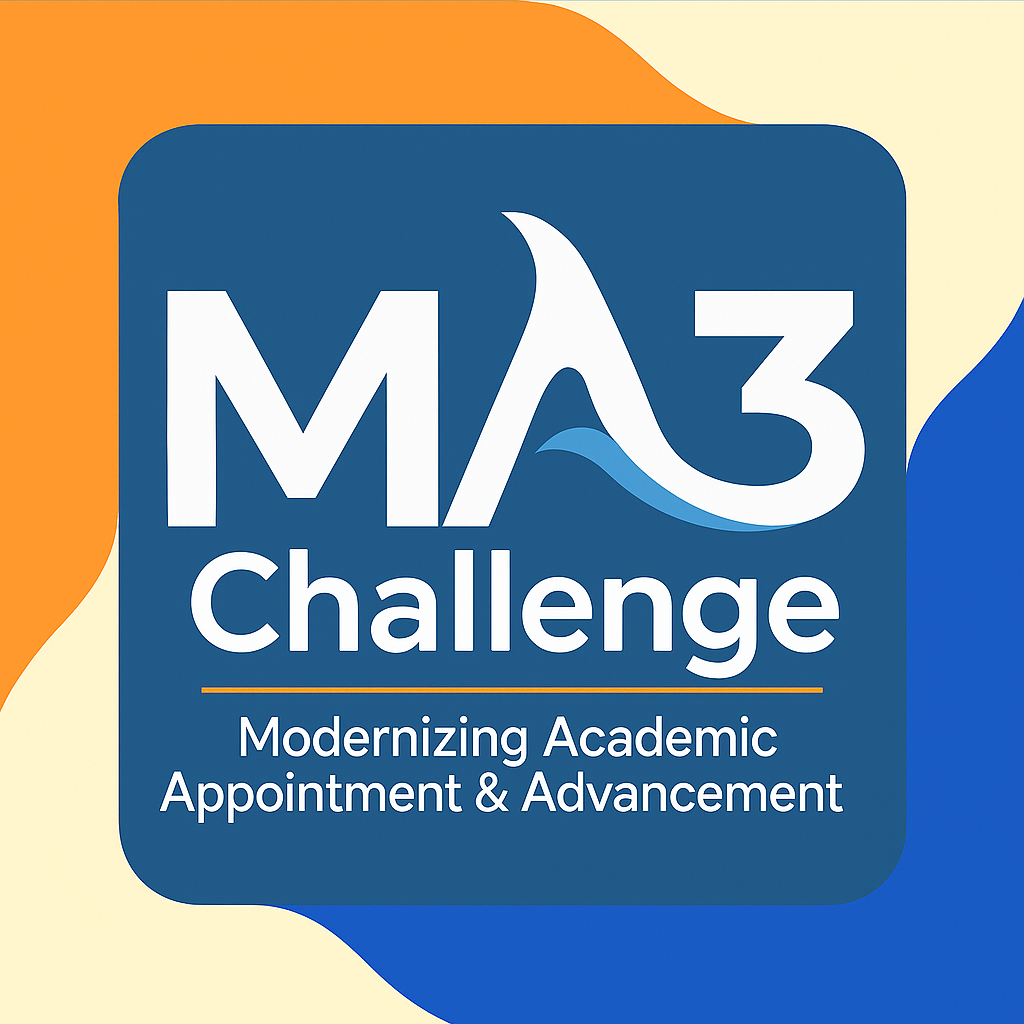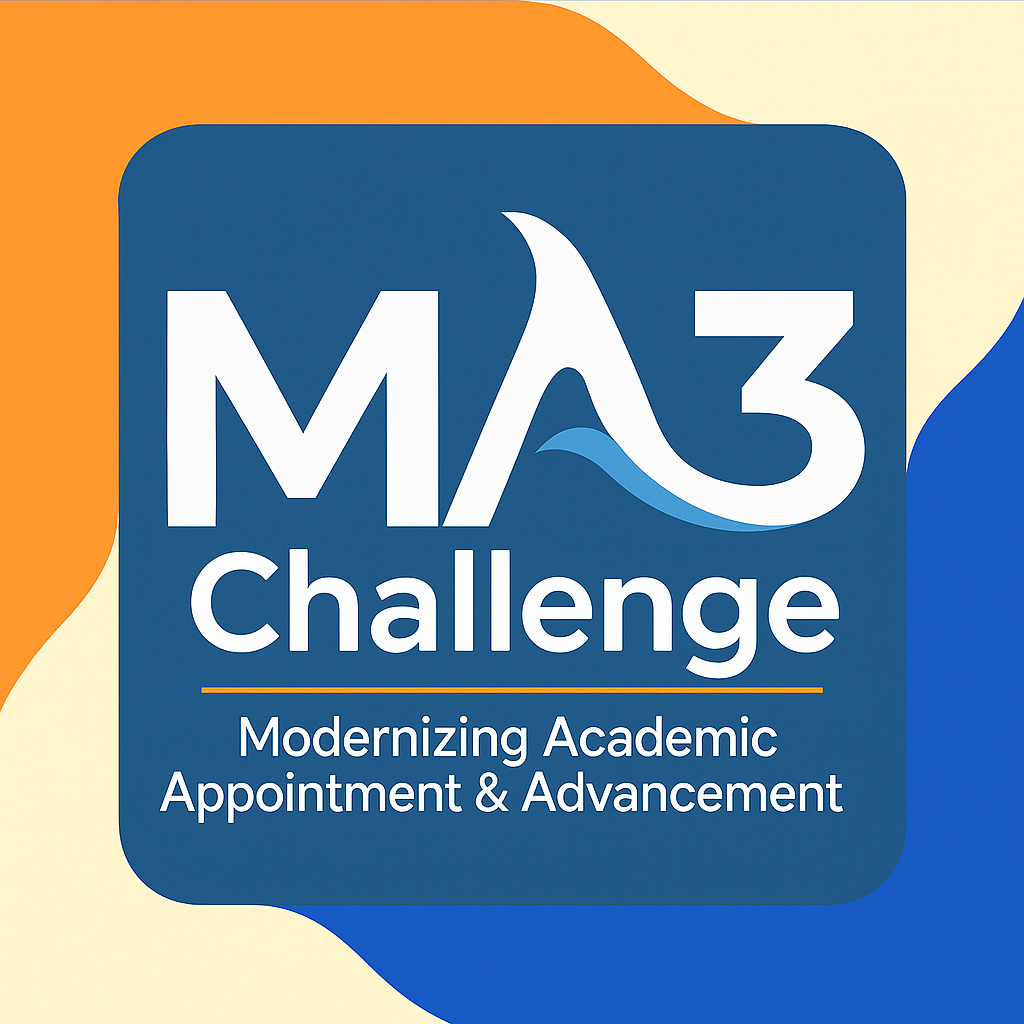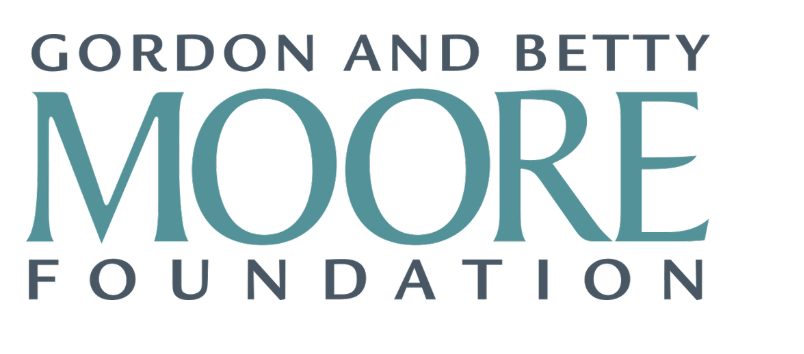MA3 Challenge
Modernizing Academic Appointment & Advancement
The Modernizing Academic Appointment and Advancement (MA3) Challenge invites proposals from U.S.-based accredited, tax-exempt colleges and universities—including their departments, centers, and institutes—to reimagine their academic hiring, review, promotion, and tenure (RPT) processes. This initiative seeks bold, creative strategies to develop academic reward systems that foster a collaborative, responsive, and transparent research environment.
There is currently a significant disconnect between what institutions purport to value - access to knowledge, improving the pace of discovery, public trust in and community engagement with science, etc. - and the activities they tend to reward, like publishing scholarly works in high impact factor, big brand journals. If activities that advance these values - like open science, public engagement, civic science, team science, and diverse contributions to knowledge - are to propagate at scale, hiring and evaluation systems need to reward them properly.
The Challenge is organized by the Open Research Community Accelerator (ORCA) in partnership with the American Academy of Arts and Sciences and the Aspen Institute. The Gordon and Betty Moore Foundation, the Dana Foundation, the Rita Allen Foundation, and the Robert Wood Johnson Foundation have contributed $1.5 million dollars, collectively, to institutions seeking funding for efforts that lead to (1) explicit changes in hiring and RPT policies and practices, and (2) strengthened capacity to promote these changes within and across institutions.
With up to $1.5 million in awards, this initiative incentivizes bold proposals that elevate open science, public engagement, civic science, innovation, team science, and diverse scholarly contributions.
The MA3 Challenge Application Portal is closed and applications are under review!
Request a Consult
A member of the MA3 Challenge team is available to meet virtually between September 15 and December 19, 2025.
Download the Application Guide
The guide includes information about the awards and how they will be scored.
Join Office Hours
Every Thursday (EXCEPT 12/25/2025 and 1/1/2026), MA3 Challenge organizers will host office hours from 2 pm ET to 3 pm ET. RSVP below to receive a link.
Information Sessions
-
Virtual Information Session 1
October 1, 2025, 3 pm ET / 12 pm PT
-
*New October Session Added*
We have added a new session on October 21st, a 2 pm ET / 11 am PT
-
Virtual Information Session 3
November 19, 2025, 12 pm ET / 9 am PT
September 15, 2025
Start date of accepting proposals.
Key Dates
January 8, 2026
End date for submitting proposals.
February 2026
Awardees will be notified.
Eligibility
MA3 Challenge Goals
Potential applicants should meet all four of the MA3 Challenge Goals:
-
Aligning hiring and review, promotion and tenure (RPT) with the public good helps institutions genuinely serve society, diversify research agendas, and restore public trust in science.
-
The existing incentive structure disproportionately disadvantages scholars who focus on societal impact or engage deeply in mentorship—activities more frequently undertaken by faculty from a range of backgrounds and experiences. The undervaluation of this work contributes to persistent disparities in faculty demographics and limits the range of research questions pursued, often sidelining issues critical to underserved communities (Whittaker & Montgomery, 2014).
Advancement of complete lifecycle – e.g., development, socialization, implementation, and assessment – of new research evaluation approaches, procedures, and/or criteria.
Development of training modules, tools, and infrastructure to effect the rapid transformation of review, promotion, and tenure processes, hiring, and/or awards.
Creation of qualitative indicators and datasets for effectively recognising diverse research contributions, societal impact, etc.
Facilitation of traditionally under-resourced partnerships among researchers, community organizations, policymakers, and/or the general public, as well as criteria to recognize the impact of these activities.
Development of public science communication and outreach efforts, as well as criteria to recognize the impact of these activities.
Enhancement of tools and platforms for team science and interdisciplinary science, as well as criteria to recognize the impact of these activities.
-
The grant acknowledges that undergoing hiring and RPT reform takes a significant amount of time, and often involves navigating governance structures in various forms. The grant is intended to support dedicated time to lead reform efforts across units.
-
The goal is to support actions that implement tangible changes to academic appointment and advancement. No more than 50% of the award may be used for planning phase.
We are particularly interested in proposals that address…
To whom should academic work be accessible, and to what end?
How can academics effectively communicate their work to other scholars, the public, practitioners, and policymakers?
How should quality and rigor be indicated or measured?
How can evaluation systems incorporate and elevate diverse contributions to the scholarly record?
How can academics meaningfully engage with impacted communities and populations in their research lifecycle?
What aspects of academic work should be transparent, reproducible, and/or verifiable, and how?
What does effective and impactful collaboration look like?
Frequently Asked Questions
-
No. While we encourage proposals to modernize academic appointment and advancement like hiring, review, promotion, and tenure, proposals can focus on just one aspect, such as hiring OR promotion OR tenure.
-
While we are able to receive multiple submissions from one institution, please note that the principal investigator and proposed activities must be different, and that the MA3 Challenge organizers will most likely reach out to the applicants to encourage coordination and partnership, as applicable.
-
Both the application guide (as of October 3rd) and the application portal include recommended word counts for each question. We do not have a set or required page limit, but we suggest that applicants not go over the recommended word limits.
We also do not have a specific budget template because we encourage flexibility in approaches; however, we do ask for a spreadsheet. Please carefully read through the budget section of the application guide for specific guidance on the types of fundable activities, and note that 1) no more than 15% of the total award budget can be used for indirect costs and that 2) no more than 50% of the activities should be planning period activities (research, focus groups, etc.).
-
While research, measurement, and evaluation are integral to successfully modernizing how researchers are and should be incentivized, we are prioritizing proposals that describe clear plans for making explicit changes to their academic appointment and advancement processes, policies, and guidelines.
Research is allowed as part of planning period activities, and measurement and evaluation a component of how you evaluate your activities, but should not be a primary focus of the proposal. Note that we ask that institutions share how they plan to measure and evaluate success in the application, but we do not necessarily need specific measurement and evaluation outcomes.
-
The timeline is intended to spur participating institutions to be rigorous and focused in their approaches, as well as begin to provide case studies for other institutions engaging in their own RPT modernization efforts.
-
There are no rigid parameters to limit a proposal’s scope. We anticipate and encourage a diversity of approaches to achieve the goal of modernizing academic hiring, review, promotion, and tenure criteria to explicitly reward activities that align with institutional values. A nonexclusive list of the types of projects that would be within scope includes the following:
Advancement of complete lifecycle – e.g., development, socialization, implementation, and assessment – of new research evaluation approaches, procedures, and/or criteria.
Development of training modules, tools, and infrastructure to effect the rapid transformation of review, promotion, and tenure processes, hiring, and/or awards.
Creation of qualitative indicators and datasets for effectively recognising diverse research contributions, societal impact, etc.
Facilitation of traditionally under-resourced partnerships among researchers, community organizations, policymakers, and/or the general public, as well as criteria to recognize the impact of these activities.
Development of public science communication and outreach efforts, as well as criteria to recognize the impact of these activities.
Enhancement of tools and platforms for team science and interdisciplinary science, as well as criteria to recognize the impact of these activities.
-
As a condition of Award, representatives from the Challenge winners will participate in a community of practice over the duration of the program, overseen by the Open Research Community Accelerator (ORCA). This will provide them with support in the development, execution, and assessment of their modernization strategies. It will facilitate the rapid sharing of challenges and lessons learned across the cohort, and create the conditions under which key findings can be efficiently and rapidly shared with the wider higher education community.
-
For Tier 1 grants, eligible principal investigators are members of the executive leadership team at eligible U.S. colleges and universities or are leaders working closely with the executive leadership team (provost or vice provost, chancellor, dean of faculty, etc.) to move activities forward. They have visibility into and influence on institutional policies and practices, and access to the resources needed to optimize and implement the award. They also possess the skills needed to cultivate trusting relationships with faculty governance bodies and other campus stakeholders. If the PI is not a member of the executive leadership team, please provide a letter of support from your institution's administration.
For Tier 2 grants, eligible principal investigators are department or unit chairs and center directors, provided they supply letters of support from their institution’s executive leadership (e.g., presidents, provosts, chancellors, vice presidents, vice provosts, deans, unit heads).
-
MA3 Challenge funding must go to one college or university where the PI is employed, but a cohort or system-wide approach to activities and outcomes is welcome and encouraged. For example, if a cohort of universities or departments will be participating in MA3 activities and modernization efforts, then the PI would most likely apply for a Tier 1 award.
-
Yes. While the principal investigator must be based at a US-based accredited, tax-exempt college and/or university, partnerships are allowed. Another organization outside of the academic institution can serve as a sub-awardee, and we encourage partnerships with, for example, professional societies and higher education institutions. This also includes independent contractors, who can serve as sub-awardees, but not PIs.
-
There are no rigid parameters to limit the role professional societies might play in submitted proposals. Acknowledging that professional societies play a unique and critical role in identifying, articulating, and socializing appropriate norms within their disciplines, the Challenge encourages departments, centers, and institutes to collaborate with them in areas including, but not limited to, building upon disciplinary standards and good practices; leveraging existing field-specific training resources and infrastructure; developing plans to disseminate lessons learned across other departments within the discipline; and building upon established engagement and communication channels.
-
While institutional context and readiness for change is a key piece of the proposal and evaluation process, we understand your institution may not have started conversations about modernizing appointment and advancement. This will not disqualify an applicant, as you may have activities and approaches to reform that will still achieve the four MA3 goals.
We encourage you to include details about awareness-raising in your approach and activities section of the application.
-
Yes. The MA3 Challenge invites institutions to examine and modernize their full appointment and advancement systems, including teaching, service, and research. All are in scope.
-
You can still apply! While your application activities might look slightly different than an institution just starting the process, you are welcome to apply for funding to continue modernization efforts.
MA3 Community of Practice
In addition to the cash awards, participants will form a community of practice, meeting regularly to exchange experiences, troubleshoot challenges, and share lessons learned. This collaborative structure will be overseen by ORCA, and is designed to accelerate learning within the cohort and ensure that emerging insights can be efficiently disseminated to the broader higher education community.










